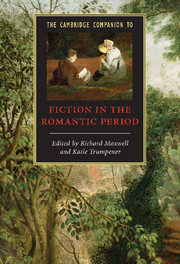Book contents
- Frontmatter
- Introduction
- 1 The historiography of fiction in the Romantic period
- 2 Publishing, authorship, and reading
- 3 Gothic fiction
- 4 The historical novel
- 5 Thinking locally: novelistic worlds in provincial fiction
- 6 Poetry and the novel
- 7 Orientalism and empire
- 8 Intellectual history and political theory
- 9 Women writers and the woman’s novel: the trope of maternal transmission
- 10 Tales for child readers
- 11 Sentimental fiction
- 12 Fiction and the working classes
- 13 The Irish novel 1800-1829
- 14 Scotland and the novel
- Further reading
- Index
- Series List
8 - Intellectual history and political theory
Published online by Cambridge University Press: 28 January 2009
- Frontmatter
- Introduction
- 1 The historiography of fiction in the Romantic period
- 2 Publishing, authorship, and reading
- 3 Gothic fiction
- 4 The historical novel
- 5 Thinking locally: novelistic worlds in provincial fiction
- 6 Poetry and the novel
- 7 Orientalism and empire
- 8 Intellectual history and political theory
- 9 Women writers and the woman’s novel: the trope of maternal transmission
- 10 Tales for child readers
- 11 Sentimental fiction
- 12 Fiction and the working classes
- 13 The Irish novel 1800-1829
- 14 Scotland and the novel
- Further reading
- Index
- Series List
Summary
‘Useful books’: The use and abuse of novels in the Romantic age
In his autobiography, the London Corresponding Society activist Francis Place reflected on the ways that “a love for reading, and a desire for information” which had been “implanted” by his “good schoolmaster” encouraged him to embark on a program of self-education which was as relentless as it was serious: “even while I was an apprentice, I always found some time for reading, and I almost always found the means to procure books, useful books, not Novels.” Eager to establish his credentials for political enfranchisement in the service of a broader vision of democratic republicanism in which the status of citizenship rested on the sure ground of individual merit rather than the idle privilege of landed wealth, Place was understandably anxious to demonstrate the intellectual rigor of his reading habits:
I had read in English the only language in which I could read, the histories of Greece and Rome, and some translated works of Greek and Roman writers. Hume Smollett, Fieldings novels and Robertsons works, some Hume Essays, some Translations from french writers, and much on geography - some books on Anatomy and Surgery, some relating to Science and the Arts, and many Magazines. I had worked all the Problems in the Introduction to Guthries Geography, and had made some small progress in Geometry. I now read Blackstone, Hale's Common Law, several other Law Books, and much Biography.
- Type
- Chapter
- Information
- The Cambridge Companion to Fiction in the Romantic Period , pp. 143 - 158Publisher: Cambridge University PressPrint publication year: 2008

